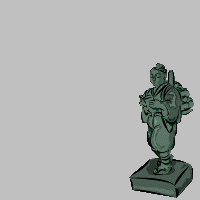二宮 金次郎 (尊徳)
にのみや|きんじろう|たかのり
Ninomiya|Kinjirō|Mototoku
Kinjiro Ninomiya (Sontoku)
Kinjiro Ninomiya (Sontoku)
二宫金次郎(尊德)
二宮 金 次郎 ( 尊 徳 )
にのみや|きむ|じろう|とうと|とく
Ninomiya||Jiro|respected|virtue
Ninomiya Kinjiro (Sontoku)
今 でも 多く の 小学校 に 銅像 が ある 二宮 金 次郎 は 、 貧しい 農家 に 生まれながら も 学問 に 励んで 出世 し 、 藩 の 財政 を 立て直したり 、 田畑 の 開墾 を 指導 して 六百 余り の 村 を 復興 さ せた 人物 です 。
いま||おおく||しょうがっこう||どうぞう|||にのみや|きむ|じろう||まずしい|のうか||うまれながら||がくもん||はげんで|しゅっせ||はん||ざいせい||たてなおしたり|たはた||かいこん||しどう||ろくひゃく|あまり||むら||ふっこう|||じんぶつ|
||||elementary school||statue|||Ninomiya||||poor|farmhouse||born||learning||striving|success||clan||finances||restructured|fields||reclaiming land||guidance||six hundred|more than||||recovery|||figure|
Ninomiya Kinjiro, who still has many statues in elementary schools, was born into a poor farming family but studied hard to succeed. He rebuilt the domain's finances, led the development of fields, and revitalized over 600 villages.
これ は 、 この 二宮 金 次郎 の 少年 時代 の お 話し です 。
|||にのみや|きむ|じろう||しょうねん|じだい|||はなし|
|||Ninomiya|||||time||||
This is a story from the childhood of Ninomiya Kinjiro.
相 模 国 ( さ が みの くに → 神奈川 県 ) に 生まれた 金次郎 は 、 とても 貧しい 農家 の 長男 でした 。
そう|かたど|くに|||||かながわ|けん||うまれた|きんじろう|||まずしい|のうか||ちょうなん|
|Agatamori||||||||||Kanjiro||||||eldest son|
Kinjirō, born in Sagami Province (Kanagawa Prefecture), was the eldest son of a very poor farmer.
とても 貧しかった ので 、 その 日 の 食べる 物 にも 困って い ました 。
|まずしかった|||ひ||たべる|ぶつ|に も|こまって||
|poor||||||||||
They were so poor that they struggled to find food for that day.
そこ で 仕方なく 、 末 の 弟 を 親戚 の 家 に 出す 事 に なった のです 。
||しかたなく|すえ||おとうと||しんせき||いえ||だす|こと|||
|||youngest||||||||||||
So, as a last resort, it was decided to send the youngest brother to a relative's house.
その 夜 、 お 母さん は 息子 の 金 次郎 に 泣きつき ました 。
|よ||かあさん||むすこ||きむ|じろう||なきつき|
||||||||||begged|
That night, the mother pleaded with her son, Kinjiro, in tears.
「 金 次郎 。
きむ|じろう
Kin Jiro.
わたし は やっぱり 嫌だ よ 、 あの 子 を 親戚 に やる なんて 」 それ を 聞いた 金 次郎 は 、 お 母さん に 言い ました 。
|||いやだ|||こ||しんせき||||||きいた|きむ|じろう|||かあさん||いい|
||||||||||give||||||||||||
I really don't want to give that child to relatives,
「 わかり ました 。
I understand.
明日 から は 、 わたし が 人 の 二倍 働き ます 。
あした|||||じん||ふた ばい|はたらき|
|||||||twice||
Starting tomorrow, I will work twice as hard as others.
だから 弟 は 、 すぐ に 帰して もらい ましょう 」 「 ああ 、 金 次郎 。
|おとうと||||かえして||||きむ|じろう
So let's have my younger brother return home soon." "Ah, Kinjirou.
すま ない ねえ 」 金 次郎 は 弟 が 帰って 来る と 、 前 より もっと 働か なければ なり ませ ん でした 。
|||きむ|じろう||おとうと||かえって|くる||ぜん|||はたらか|||||
"Sorry, hey," Kinjiro had to work even harder when his younger brother returned home than before.
朝 早くから たきぎ を 拾って 町 で 売り 、 それ が 終わる と 夕方 まで 畑 を 耕して 、 そして 夜 は 遅く まで わらじ を 作り ました 。
あさ|はやく から|たき ぎ||ひろって|まち||うり|||おわる||ゆうがた||はたけ||たがやして||よ||おそく||||つくり|
|early|firewood||picking||||||||||field||plowing|||||||||
He would get up early in the morning to gather firewood to sell in town, then till the fields until evening, and finally make wooden clogs late into the night.
お 母さん は 体 が 弱くて 、 あまり 働け ない ので 、 十五 才 の 金 次郎 が 一 人 で 家族 を 養う のです 。
|かあさん||からだ||よわくて||はたらけ|||じゅうご|さい||きむ|じろう||ひと|じん||かぞく||やしなう|
|||||||||||||||||||||support|
Because his mother was weak and couldn't work much, fifteen-year-old Kinjiro had to support the family all by himself.
それ は 大変な 苦労 でした が 、 金 次郎 は 文句 一 つ 言い ませ ん 。
||たいへんな|くろう|||きむ|じろう||もんく|ひと||いい||
|||hardship|||||||||||
It was a great deal of hard work, but Kinjiro did not complain even once.
それどころか 、 「 移動 する 時間 、 何も し ない の は もったいない な 。
|いどう||じかん|なにも||||||
|moving|||||||||
On the contrary, he thought, 'It would be a waste of time to do nothing while moving.'
時間 は 、 上手に 使わ なくちゃ 」 と 、 たき ぎ を 町 へ 売り に 行く 時 は 、 本 を 大声 で 読み ながら 歩いた のです 。
じかん||じょうずに|つかわ||||||まち||うり||いく|じ||ほん||おおごえ||よみ||あるいた|
'I must use my time wisely,' he would walk while loudly reading a book when going to sell firewood in town.
この 当時 、 農家 の 人間 が 勉強 する の は 珍しい 事 でした 。
|とうじ|のうか||にんげん||べんきょう||||めずらしい|こと|
|at that time|||||||||||
At that time, it was unusual for farmers to study.
ですから 、 この 金 次郎 の おかしな 行動 は 、 すぐ に 村中 に 広まり ました 。
||きむ|じろう|||こうどう||||むらなか||ひろまり|
|||||strange|behavior||||||spread|
So, Kintaro's strange behavior quickly spread throughout the village.
「 あの 子 、 勉強 し ながら 歩いて いる よ 」 「 ほんと 、 全く 変わった 子 だ ね 」 そして それ を 知った 親戚 の おじさん は 、 金 次郎 を 叱り つけ ました 。
|こ|べんきょう|||あるいて||||まったく|かわった|こ||||||しった|しんせき||||きむ|じろう||しかり||
|||||||||||||||||||||||||scold||
"That child is walking while studying." "Really, he's a completely different child." And when relatives found out about it, they scolded Kintaro.
「 馬鹿者 !
ばか しゃ
fool
"Fool!
農家 の 人間 に 、 学問 など いら ん のだ !
のうか||にんげん||がくもん||||
||||study||||
Farmers don't need academic knowledge!
だいたい 本 を 買う 金 が あったら 、 家族 に 食べ物 でも 買って やれ !
|ほん||かう|きむ|||かぞく||たべもの||かって|
If you have money to buy books, buy food for your family instead!
」 しかし 金 次郎 は 、 おじさん に 叱ら れて も 、 こっそり 勉強 を 続け ました 。
|きむ|じろう||||しから||||べんきょう||つづけ|
||||||scolded|||||||
However, Kinjiro continued to study in secret, even when scolded by his uncle.
こうして 勉強 を 続けた 金 次郎 は 、 やがて どんどん 出世 を して 、 村 一 番 の お 金持ち に なった のです 。
|べんきょう||つづけた|きむ|じろう||||しゅっせ|||むら|ひと|ばん|||かねもち|||
|||||||before long||success|||||||||||
In this way, Kinjiro, who continued to study, eventually rose through the ranks and became the wealthiest person in the village.
おしまい
The End

